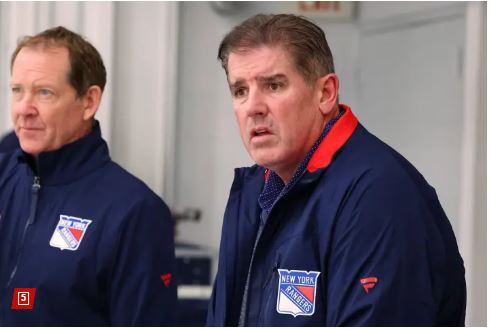
VANCOUVER, BC — Competition is at the heart of everything the Rangers do today.
That is the overarching philosophy that head coach Peter Laviolette has established in the Blueshirts’ new daily routine during his first five weeks in charge.
It has increased the pace, intensity, and emotion with which the Rangers conduct their business.
They may leave the ice after a 35-minute practice with beet red faces and gushing sweat, just like they do after a 60-minute game.
Sometimes a bunch of players will cheer so loudly after a goal in a skills practice that it feels like it happened in Game 7 of the playoffs.
It all comes down to encouraging that competition.
When you win, you can have more pleasure.
When you lose, it appears that a chemical is generated in your brain that motivates you to improve so that you can win the following time.
It’s the exact science of how competition impacts anyone’s psychology.
“It’s a lot of fun, but guys don’t want to lose,” Chris Kreider told The Post following another energetic practice Friday afternoon at Rogers Arena. “We keep track of wins and losses. You can hear how energetic it is. Men are hooting and yelling. It’s all in the spirit of competitiveness. It’s all competitive.
“After losing one of those competitive drills, you want to win the next one even more. Everyone is pushing each other. It’s a lot of fun.
I think it’s fantastic for our team.” Laviolette, as promised in his opening press conference, set the tone for training camp.
The Rangers would only operate at one pace, and that was full speed.
Laviolette came out and stated he wanted rigorous, tough sessions because that was part of the job.
The message was to go out on the rink and allow each individual player to demonstrate their greatness. Kaapo Kakko described it as the most difficult training camp he’d ever attended as he prepares for his sixth NHL season.
The intensity of the Rangers’ on-ice workouts has increased, but the diversity of work and range of drills that Laviolette, coaching assistants Michael Peca, Phil Housley, and Dan
Muse, along with skills coach Christian Hmura, has also joined the club. The Rangers regularly practice three-on-three and four-on-four.
They set up tight drills in the corner, with two goals facing the curve of the boards at 90-degree angles, to encourage good stickhandling and physicality on the muddy ice.
Morning skate sessions are designed to help players feel the puck, get into the flow of a game, and put the team in a battle-ready mindset.
Mika Zibanejad noticed that Laviolette’s morning skates differ from what he had previously encountered.
Laviolette stated earlier this season that morning skates offer an opportunity to establish the tone for the day, and that he prefers to have structure in the team’s schedule before to games.
No two sessions are alike under Laviolette, who is as invested and involved with the Rangers as they are with the puck.
He is meticulous about giving each player special attention in private chats both on and off the ice.
“Last year was more like we knew what we were going to do out there every time, same practices,” Kakko advised. “It can be beneficial to skate in the morning before a game. However, I believe that these [practices] are always enjoyable when there is no game and little competition. Every player wants to win.
“Every day, there’s something new on the ice. You need to think about it a little. Not simply get on the ice, do it, and come back. It’s a little different, but I think it’s doing well so far. Erik Gustafsson, who played for Laviolette in Washington last season, acknowledged that the 58-year-old bench manager operated the same way with the Capitals.
His attitude to sessions and morning skates has long been a hallmark of Laviolette’s coaching philosophy.
Leave a Reply